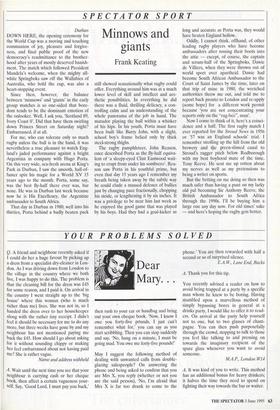SPECTATOR SPORT
Minnows and giants
Frank Keating
Durban DOWN HERE, the opening ceremony for the World Cup was a moving and touching communion of joy, pleasure and forgive- ness, and final public proof of the new democracy's readmittance to the brother- hood after years of mostly deserved banish- ment. The match which followed President Mandela's welcome, when the mighty all- white Springboks saw off the Wallabies of Australia, who hold the cup, was also a heart-stopping event.
Since then, however, the balance between 'minnows' and 'giants' in the early group matches is so one-sided that bore- dom tends to be the dominant emotion of the onlooker. Well, I ask you, 'Scotland 89, Ivory Coast 0'. Did that have them swirling down Princes Street on Saturday night? Embarrassed, if at all.
For me, who can tolerate only so much rugby unless the ball is in the hand, it was nevertheless a true pleasure to watch Eng- land's jaded performance against a bright, Argentina in company with Hugo Porta. On this very wide, sea-fresh arena at King's Park in Durban, I saw the smooth, hall-of- famer spin his magic for a World XV 15 years ago to the month. Porta, some say, was the best fly-half there ever was, bar none. He was in Durban last week because now he is His Excellency, the Argentine ambassador to South Africa.
That day in Durban in 1980, well into his thirties, Porta behind a badly beaten pack still showed sensationally what rugby could offer. Everything around him was at a much lower level of skill and intellect and aes- thetic possibilities. In everything he did there was a fluid, thrilling delicacy, a con- trolling calm and an understanding of the whole panorama of the job in hand. The matador playing the bull within a whisker of his hips. In his youth, Porta must have been built like Barry John, with a slight, school boy's frame belied only by thick steel-strong thighs.
The rugby pamphleteer, John Reason, once described Porta as the fly-half equiva- lent of 'a sleepy-eyed Clint Eastwood wait- ing to erupt from under his sombrero'. Rea- son saw Porta in his youthful prime, but even that day 15 years ago I remember my breath being taken away by the subtle way he could elude a massed defence of bullies just by changing pace fractionally, chopping his stride, or lengthening it by six inches. It was a privilege to be near him last week as he enjoyed the good game that was played by his boys. Had they had a goal-kicker as long and accurate as Porta was, they would have beaten England hollow.
Oddly, I cannot think, offhand, of other leading rugby players who have become ambassadors after tossing their boots into the attic — except, of course, the captain and scrum-half of the Springboks, Dawie de Villiers, when they were thrown out of world sport over apartheid. Dawie had become South African Ambassador to the Court of Saint James by the time, later on that trip of mine in 1980, the wretched authorities threw me out, and told me to report back pronto to London and re-apply (some hope) for a different work permit because 'you are not concentrating your reports only on the "rug-bee", mun'.
Now I come .to think of it, here's a coinci- dence and a half. The first rugby match I ever reported for the Stroud News in 1956 or '57 was an England schools' trial. I remember strolling up the hill from the old brewery and tie green-slimed canal to Stroud's rugger pitch below Rodborough with my best boyhood mate of the time, Tony Reeve. He sent me up rotten about my nerves as well as my pretensions to being a writer on sports.
But the betting on me doing so then was much safer than having a punt on my larky old pal becoming Sir Anthony Reeve, the British Ambassador to South Africa through the 1990s. I'll be buying him a large one any day now. For old times' sake — and here's hoping the rugby gets better.


































































 Previous page
Previous page